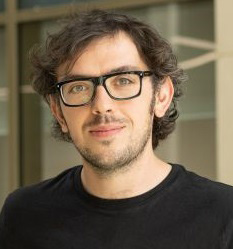 Dr. Richard Mandle was awarded BSc and MSc degrees in Chemistry from the University of Hull. He completed his PhD in Chemistry under the supervision of Professor John Goodby FRS at the University of York in 2013 (thesis title: “The Nitro Group in Liquid Crystals”). In postdoctoral positions he developed new materials for consumer LCD devices and worked on developing materials that exhibit new nematic phase types (York), as well as on auxetic elastomers (Leeds). Dr. Mandle has published over 80 peer reviewed journal articles, was awarded the Young Scientist award of the British Liquid Crystal Society in 2017 and the Vorländer Lectureship of the German Liquid Crystal Society in 2022. In 2022 Dr. Mandle was awarded a prestigious UKRI Future Leaders Fellowship which he holds as a joint appointment between the School of Chemistry and the School of Physics and Astronomy at the University of Leeds.
Dr. Richard Mandle was awarded BSc and MSc degrees in Chemistry from the University of Hull. He completed his PhD in Chemistry under the supervision of Professor John Goodby FRS at the University of York in 2013 (thesis title: “The Nitro Group in Liquid Crystals”). In postdoctoral positions he developed new materials for consumer LCD devices and worked on developing materials that exhibit new nematic phase types (York), as well as on auxetic elastomers (Leeds). Dr. Mandle has published over 80 peer reviewed journal articles, was awarded the Young Scientist award of the British Liquid Crystal Society in 2017 and the Vorländer Lectureship of the German Liquid Crystal Society in 2022. In 2022 Dr. Mandle was awarded a prestigious UKRI Future Leaders Fellowship which he holds as a joint appointment between the School of Chemistry and the School of Physics and Astronomy at the University of Leeds.
Read Richard’s Emerging Investigator article ‘A new order of liquids: polar order in nematic liquid crystals’
How do you feel about Soft Matter as a place to publish research on this topic?
The nascent field of ferroelectric nematics sits at a sort of tricritical point between chemistry, physics and mathematics; Soft Matter cuts right across these scientific disciplines and beyond, and so is a really good fit for this sort of work.
What aspect of your work are you most excited about at the moment and what do you find most challenging about your research?
Ferroelectric nematics are capable of all sorts of things that no other known state of matter can do, so understandably there is huge excitement about possible applications. We are getting pretty good at developing new materials, but relating the physical properties back to molecular structure is a bit of a black box at the moment.
In your opinion, what are the most important questions to be asked/answered in this field of research?
I think it is fair to say that the discovery of polar order and ferroelectricity in fluids looks to be of the highest significance. Probably the biggest question right now is “how universal is polar ordering, and this new phase of matter?” is it restricted to a few odd molecules, or are we dealing with a more general phenomenon? Right now, evidence points to the latter, which is really important given that there is a big expectation that this discovery will end up in all manner of applications.
Can you share one piece of career-related advice or wisdom with other early career scientists?
Your job is only one part of your life and, in the far distant future, when you retire it’s gone. Make time for the stuff that really matters.










